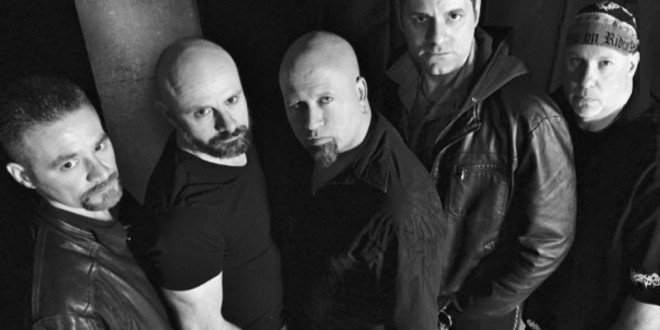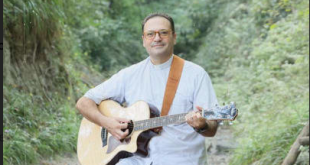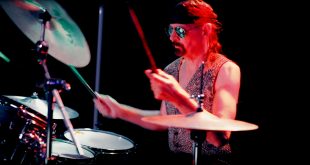It’s surprising how easily a perfectly executed guitar riff can transport listeners back through time. Wicked Maraya does just that with their track, “Sound of Evil”—evoking not only the imagery of a rugged heavy metal band, but also the feel of a dimly lit, slightly hazy club. The tiniest wisp of smoke floats across captivated faces while sweaty bodies slowly graze against one another. Everyone cranes for a look at the enigmatic quintet right as the music’s building intensity explodes into the raw burst of energy that is Lifetime in Hell.
Recorded in 1991, Lifetime in Hell‘s release was delayed due to challenges associated with an independent label. Despite quickly amassing a following after a move to Los Angeles’s Sunset Strip, record companies were focused more on grunge than metal at the time, and Lifetime in Hell was eventually forgotten. This did not hamper Wicked Maraya, given the success of 1994’s Cycles and the group’s tours with acts as revered as Metal Church, Widowmaker, and Yngwie Malmsteen. However, the band eventually took a hiatus after experimenting in two albums under the name Maraya.
Nearly two decades later, Wicked Maraya has released Lifetime in Hell with Massacre Records—treating longstanding fans and new listeners alike to the band’s original sound before ending with two new tracks that bring the album into the present.
Music Existence was able to sit down with Wicked Maraya’s charismatic vocalist, Lou Falco last week to discuss the group’s journey, the benefits of playing in a band with friends, and the progression of the metal industry.
ME: I’ve listened to Lifetime in Hell, and I’ve got to say it’s exciting to hear something different than other music being released at this time.
Falco: Yeah! As a 25-year old CD, it definitely has a different feel to it. The two new songs are a little more “now,” but [the rest] is a trip.
ME: Almost like reliving history.
Falco: It is. I vividly remember when we were in the studio [recording back then], and the album was unfortunately just forgotten. But now that it’s out and in public, people are digging on it. The reviews we’re getting are pretty wild. Music Existence gave us a really good review as well.
ME: Since this album marks your first release after this long period of time, I was wondering what caused Wicked Maraya to go on hiatus and what you’ve been up to all this time.
Falco: [It was] just the music business itself. We weren’t where we wanted to be. We had a lot of success, especially with our Cycles record, [but] things just didn’t go the way we wanted. After we did Counterculture, we did a couple of tours and just decided, “It’s not happening.” We weren’t sure what direction we wanted to go musically, so we took a break rather than doing something that might not have turned out well. It was an 18-year break, but we’re back. We’re all on the same page. We’re real happy with the new material and think it’s a good bridge from the 25-year old album into today.
[As for] what we did when we weren’t playing, I’m down here in South Florida. I sing in a cover band, and a couple of [other] bands sometimes. John (Bass) produces. He’s got a studio, Front Row Recording, in New York. He’s done bands like Eternity Fallen. Dan (Guitar) has Soundmine Recording in Pennsylvania where we recorded the two new songs. He’s done bands like Doro Pesch, Madison Rising, and Michale Graves from the Misfits. Michael (Guitar) and Nack (Drums) have their own businesses. Music has never left any of us.I posted a song a couple of years ago—I think it was even before Facebook was around, so on Myspace—and it started getting a buzz. People were like, “Did you record new material?” I put it out there that no, we had an unreleased album. Slowly the buzz started building, and it snowballed [into us] shopping it around.
ME: Is that how you paired with Massacre Records and wound up releasing it now?
Falco: Again, being out of the scene for so long, back when we were doing stuff, you put something in an envelope and mailed it to people. Now, it’s totally different, so we did an electronic press kit. We set up a phantom page on our website for labels only, and the response was great. We actually had four or five offers, so we were pleasantly surprised. We didn’t know what to expect [since] we’d been gone so long. Massacre came in. We really liked what they had to say and the vision they had for Lifetime in Hell. Out of all the offers, theirs was the most solid, and we’re very happy to be with them.
ME: Why would you say Lifetime in Hell stalled back in 1991?
Falco: Lifetime in Hell was originally recorded in 1991 at Morrisound Recording with producer, Jim Morris. We were with an independent record label that got us that connection, which was invaluable because Jim’s influence is still inherent in what we do. But the independent label wasn’t prepared to do what needed to be done, and it basically imploded right when the record was going to be released. It fell apart.
We did own our masters, which was great. So we had all the files. It was a weird time though, because grunge started hitting, and Nirvana exploded. The shine came off of the type of metal that is on Lifetime in Hell. It was, “Well, what’s the next thing?” Grunge. If you were established, you could still have a foothold with traditional, classic metal, although some [of these bands] fell apart as well. As a newer band, we got caught up in that wave, so we went out to LA and played the Strip for about a year.
We were definitely the heaviest band out there. I can tell you that. We had a great response. The songs come across well live, but unfortunately there weren’t any takers on the album at the time—because again, everyone was looking for this new sound. Eventually, [the album] got put away and we started writing the material that would become our 1994 CD, Cycles when we were out in LA. It did very well back in the day, and we toured Europe and America. Lifetime in Hell became the forgotten child. Now we figured, let’s give it a shot. Let’s see what happens. And if we’re going to do something, we want it to be current, so we worked on the two new songs. That’s how this all came to be. It was forgotten, but now it’s finally seeing the light of day.
ME: What was it like to go back in the studio to record the new tracks?
Falco: I think “surreal” is the word. The guys and I basically grew up together. I lived around the corner from Mike and John, and Dan is their cousin. So we’ve all been together since 1988 as a band. We keep in touch, but getting all of us back into the studio was wild. You wouldn’t have known that it had been 18 years; it felt like 18 seconds. Everyone was laughing, joking, and really working off each other. We were like a machine. Everyone knows how everyone works in the studio. It was fun. It was creative. It was a long time coming.
We’re really excited, because the two new tracks hold up. They could stand very well with today’s music. Shooting the video was also great. It was the first time we’ve all been in a setting like that even though we weren’t really playing live onstage. We had a lot of laughs.
ME: Correct me if I’m wrong, but I didn’t catch any lineup changes. Is that friendship why you’ve been able to stay together? It’s a long time to go as a band without hating one another, for lack of a better phrase.
Falco: With the exception of the Counterculture record where I like to say Mike took that CD off, but he did play a few spot shows with us… Us being friends, it’s more like [we’re a family]. When you’re family, you don’t always get along. You can fight. You can have disagreements, but you are family. You’re stuck with each other.
We’ve been through so much over the years. It’s not like we were just guys that came together. A lot of bands say that they’re friends, but they’re still bands [first]. We basically lived with each other. We were in and out of each other’s house, in and out of each other’s lives, [and we knew each other’s] families, kids, wives, [and] friends. We’re intertwined so our bond is very strong.
We all grew up with the same vibe of music for the most part, so we all knew what we wanted the band to sound like musically. So there was no need to get anyone else in the band. That was a big thing when we decided to do this. We’re probably the only five that could put up with each other, too, so that friendly and family atmosphere definitely has a lot to do with us staying together.
ME: Will you be creating more music in the future or were the new tracks sort of a one-time reunion?
Falco: Massacre has expressed a definite interest in getting a full-length CD some time in the next year, which we’re happy and excited about. John actually sent a text with a video yesterday to all of us. He’s got a couple of riffs going. I’ve got ideas in my head, and I’m sure Dan and Mike are going to be getting the guitars out soon. We want to enjoy the ride on this, get on the road, and play some shows; but there will be a full-length new Wicked Maraya CD in the future. We’re pretty pumped.
ME: Would you say one of those new tracks are going to be more indicative of your current sound, or will it be something in between the two?
Falco: We ran the spectrum with those two songs. “Fall From Grace” is like a double bass freight train, yet it still has our traditional harmony, guitars, and melodic vocals/harmonies. It’s a lot of ear candy with an ethereal middle break.
I think “Suicidal Dawn” is our definitive sound. It has the moody vocals and the groove guitars with the little harmonies in between. It’s a continuation of our ’94 record, Cycles. We veered off with Counterculture and tried to experiment with new things, but we know where we were the most successful now, 18 years later. We know the sound people enjoyed, so we’re going to bring Cycles into the present and [produce] music that is true to us. The two new songs are a good indication of what a new CD would sound like.
ME: Right, and it’s pretty cool to see the evolution of your sound over the years…even now with Lifetime in Hell being the beginning.
Falco: It comes full circle [laughs]. That’s why we wanted to do new songs. We said, “We’re going to bookend it.” We have the actual first CD, now let’s get the newest stuff so people could sit, line up the CDS, and have the two new songs. I’ve been told by a couple of people that you can see the evolution of Lifetime in Hell where it went into Cycles. We’re back to where we belong, and we’re pretty happy about it.
ME: It’s nice that the new songs sound like Wicked Maraya versus bands that evolve but don’t end up sounding like themselves anymore.
Falco: Definitely, and this is where we have the advantage of taking the break. We can take a look back and say No Hope for Humanity…? and Counterculture were definitely different. They were met with positive and negative responses from both the fans and us as a band. It always happens in a band. “Let’s see what we sound like. Let’s try to do this.” Sometimes it works, and sometimes it doesn’t. Now we can look back and go, “This worked. That worked. That…might not have worked.”
We just said, “Let’s not have any preconceived notions. Let’s not try to sound like anything. Let’s just be us.” That really shines through with the new songs. [We’ve been hearing from] a lot of our hardcore fans that have stuck with us all these years [that] the new material feels like we’re flashing back but in a good way. Everything comes full circle, and we’re in a real good direction.
ME: What was the songwriting process like for the two new tracks with everyone spread out geographically?
Falco: We started the songs when I was up in New York, and then sat back to see what happened. Once we knew we were going to have Lifetime in Hell go, John worked on the songs. His son is also in a band called Eternity Fallen. He co-wrote “Suicidal Dawn” actually. So his son listened in and had a couple of cool ideas for the chorus. It was a nice family bonding moment. That was then sent to me. I got the songs and worked on the lyrics. I had my studio down here in Florida and did the scratch vocals. I demoed where I heard the songs going vocally and sent those back up. John worked on pre-production, took these demos and adjusted a couple of melody lines to what he heard in his head. Then the guys got together and tweaked some more stuff. They got the basic tracks down in the studio and then I flew up to do the vocals.
The good thing about the Internet and modern technology is that we were able to do this. I can sit in my studio, open the tracks, work on them, and then send an email back. “What do you think of this? What do you think of that?” It was pretty interesting. If we do a new CD, I’ll probably be up there a little more, because there’s nothing better than all five of us being in the same room.
ME: That wouldn’t have been possible back in the early 90s like it is now.
Falco: Oh yeah, it wouldn’t have even been thought of. I’d have to get in a plane, and we’d all be flying around the country.
ME: Wicked Maraya really came out during this time when the metal scene turned to grunge. I was wondering what your views of the metal scene today are compared to back then.
Falco: Now, the scene is wide open. I’m trying to word it right, but back then when we veered off on our sound, people were like, “Oh, I’m not sure.” And as a band, we were like, “Maybe we should try this.” There was too much thinking involved. Back then, you had to be one thing, and now you can be whatever you want. The music scene is just exploding. For any type of band, if people like it and the music is good, it’s good.
When we got back together, we said, “We’re not going to try to please [either] the American market or the European market.” In the 90’s, it was split a little [like this.] It was, “Do we want to make it in America or do we want to make it in Europe?” And that could affect how you wrote or perceived things. Now it doesn’t matter. You can be you. There are so many more avenues for people to discover music. Everything’s so accepting with the scene now that there will be a segment that will dig what we do. It’s already happening.
ME: Back then, too, you also did some extensive touring with some rather big acts, both in the United States and overseas. Did you have a favorite group to tour with or any interesting stories that came out of that experience?
Falco: My favorite was the Metal Church tour, because it was our first. It came right about the time of our European CD release. We went over there and the second day, we went to do a record signing. We were so new to the scene though, that we didn’t know we were doing a record signing. Our record label was having some fun with us.
We showed up to the store, and there are lines out the door. People were coming to the tour bus. We were laughing and saying, “Who’s here? Who do they think is here?” We got to the store, and there was our banner—“Wicked Maraya Welcome.” We didn’t realize how popular we were over there. Word of mouth travels quickly, so it was a really cool experience. Metal Church treated us great. Back then, a lot of big bands weren’t nice to support acts.
That is my favorite tour, but [we enjoyed] every band we toured with. Like Yngwie Malmsteen, who has a reputation for being a tyrant, treated us like family. He handpicked us to be his support act for part of his Seventh Sign tour. Dee Snider was a fellow Long Island guy. He was a huge supporter. Widowmaker and all of those tours were just great. As a band, we’re easy to get along with. We don’t try to have egos. If we’re supporting a major band, we just try to put on a good show and make sure we get the crowd ready. And they saw that.
ME: I can only imagine. What else is next for Wicked Maraya? Are you going to be touring?
Falco: We’re hoping to tour. The music scene is different from how it was years ago, so right now we do not have a booking agent. We’re talking with some, but they have a “wait-and-see” attitude. We’ve been gone so long that they’re all sitting back to see how everything works with the record. So far, the reviews have been amazing. People are buying the CD. If there are any booking agents out there that cover both the United States and Europe, give us a call. We’re ready to go.
ME: My last question is just if you had any last words for longtime fans or new listeners.
Falco: I just want to say thank you to you, Selby, and thank you to Music Existence for having us here for the interview. Thank you for the support. It’s pretty wild. It’s surreal. Eighteen years since we’ve done anything, and 25 years from the original [recording of] Lifetime in Hell. We’re very appreciative, very thankful, and very excited.
We want to give the fans more, and we want to do more. So just a huge thank you, and we hope to see everybody on the road. I’d be remiss if I didn’t say to pick up the CD. I think you’ll dig it. Follow us via our website, Twitter, and Facebook. We hope to have a lot of exciting information coming.
 Music Existence Because of Music, We Exist
Music Existence Because of Music, We Exist



